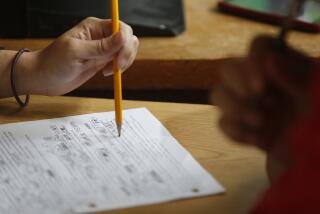EDUCATION : Simple Steps to Making the Grade on Exams
- Share via
End-of-semester exams are just a few weeks away for most junior and senior high school students.
To those who face this unpleasant ordeal, here’s some advice from a teacher who hasn’t forgotten what it’s like to be a student.
First, start studying the week before exams begin.
Make two calendars on a couple of sheets of paper: one that shows the days and times of your exams, and one that shows the hours that you will study for each exam every day of the next two weeks.
Tomorrow, ask your teachers when they will hold review sessions, which are usually the closest thing to seeing the exam ahead of time.
Like many teachers, I share my hottest secrets at review sessions. I explain what topics are likely to be covered on the exam and what types of questions I intend to ask. I even share a few sample test questions.
These review sessions are your last chance to ask questions about the material or the exam itself, so take advantage. Find out, for example, the format of the exam. Will it be one long essay? Several short essays? How about multiple choice, true-false, or fill-in-the-blank questions?
Ask about the scope, or list of topics covered on the exam, including specific people, events, theories, equations, poems.
Also find out which special materials are needed for the exam. May you use your book or notes? How about a calculator?
Take detailed notes in the review sessions. This will help you focus your studying later.
Then, look at the list of topics to be covered on the exam and, with a highlighting pen, mark any mention of the topics in your class notes. Look up each topic in the index at the back of your textbook, then copy down the main ideas from all sections that discuss those topics.
But highlighting the information isn’t enough, although many students seem to think so. You must now review the material over and over.
Say it aloud as you read it. Paraphrase it aloud after you’ve read it. Write it down several times. The more “learning modes” you use (seeing, speaking, writing, hearing), the more quickly you’ll remember the stuff.
Besides studying on your own, try working with classmates. Compare notes with them and quiz each other on the material.
Also, try to anticipate your teacher’s exam questions by making up questions in your group, based on the announced topics and format.
For example, if you know you’ll have to answer questions about insects, then make as many fill-in-the-blank questions about insects as possible, and try to answer those written by other group members.
Sleep at least eight hours the night before the exam. No matter how desperate you are, don’t stay up studying. All-nighters are a sham. You need the sleep more than you need disjointed bits of crammed material that you would probably be too tired to remember anyway.
Wake up extra early and put on some nice clothes. That’s right, dress up for your exams. Sweats may be the traditional exam attire, but they can subconsciously make you feel sluggish.
Nice clothes, however, can make you feel more alert, confident, and ready for business.
Breakfast is especially important on exam day, so try orange juice and toast or something else solid. But avoid doughnuts and other sugary foods because, after the usual sugar “high,” you will probably hit a “low” that can make you less alert during your exam.
Before leaving for school, look over your notes briefly. This isn’t a study session, just a quick look.
Get to your classroom early, sit down and set up your paper, pens, calculator or other supplies. Now you also have time to ask your teacher any final questions.
Resist the temptation to study at the last minute before the test begins. If you’ve studied well, you won’t discover anything big in the minutes before the test. And even if you did, it would probably just confuse you at this point.
Panic hits a lot of students when they first look at the exam, but you can avoid that with some standard relaxation techniques.
Slowly inhale a deep breath, hold it for about three seconds, then exhale slowly. Do this three to five times.
Also, sit with your back straight, and relax your shoulders, arms and legs. Don’t scrunch up.
Skim the whole exam text quickly and read all instructions twice. Some students don’t realize they’ve left answers incomplete because they overlooked the directions.
Also, answer the questions you know best first, and leave the others for last.
Proofread your answers when you’re finished. If you don’t, you may later discover that some silly mistakes cost you big points.
Pace yourself by checking the clock frequently to make sure you’ll have time to finish.
Finally, bear in mind that if you don’t do well, it’s just one exam.
I’d also like to say that 10 years from now a failed exam won’t matter. I’d like to, but I can’t.
Like it or not, the job market and college admission are more competitive and, for some, more out of reach every year. And, right or wrong, your grades can make you or break you, and these upcoming exams may help determine a big part of your future.
But if you can just hang in there for a couple more weeks and use my suggestions, then you can face your exams more prepared, more rested, and more confident than most of the students around you.






